Navigating the Complexities of U.S.-China Trade Relations: Insights from the Extreme Investor Network
The world of finance is no stranger to volatility, and few elements influence market conditions as profoundly as international trade relationships. In recent weeks, the tension between the U.S. and China has resurfaced, bringing investors to the edge of their seats. As discussions— or lack thereof— continue to unfold, let’s dive deeper into what this means for investors and how to navigate these uncertain waters.
Trade Talks Stalled: A Complicated Relationship
Recently, President Donald Trump expressed that negotiating with Chinese President Xi Jinping is "extremely hard." This sentiment is particularly significant given the escalating trade tensions. As U.S. Treasury Secretary Scott Bessent noted, the trade discussions appear to have "stalled," highlighting the need for intervention from both leaders to reinvigorate dialogue.
Reports from the White House suggest a potential conversation between Trump and Xi this week, although the logistics remain uncertain. The echo of Trump’s words on Truth Social illustrates the challenges at hand, noting Xi as a "very tough" negotiator.
The Fallout of Trade Agreements
A recent trade agreement between the U.S. and China, signed in Switzerland, included a 90-day suspension of most tariffs. However, tensions have escalated as both parties accused each other of violating its terms. China, in particular, has not lifted restrictions on rare earth exports, an area of significant concern for U.S. industries relying on these materials.
Moreover, the U.S. government’s steps to restrict China’s access to advanced technology will have implications not just for bilateral relations but also for global supply chains. The decision to revoke visas for Chinese students could further strain relations, with long-term impacts on innovation in both countries.
A Call for Trust Building
The recent meetings between U.S. Ambassador David Perdue and Chinese Foreign Minister Wang Yi highlighted the importance of rebuilding trust. Perdue reportedly emphasized American priorities on trade, illegal immigration, and fentanyl, seeking a more cohesive diplomatic relationship. For investors, this underscores the increasing importance of global communication in an interconnected market.
What’s Next?
Analysts suggest that while Trump has expressed his desire for dialogue with Xi, the Chinese government may only agree to discussions if they are confident there won’t be unexpected announcements or decisions that could derail the talks.
The importance of stable U.S.-China relations can’t be overstated; the ramifications extend far beyond national borders, impacting global markets, trade patterns, and investment strategies.
Strategic Considerations for Investors
As we navigate these geopolitical complexities, investors should focus on:
-
Understanding Market Sensitivity: Trade tensions can lead to sudden shifts in market sentiment. Stay informed about developments in U.S.-China relations, as these can influence stock prices and overall market health.
-
Diversifying Investments: Geopolitical risks can affect specific sectors differently. Diversifying your portfolio across various industries and regions can help mitigate losses.
-
Staying Ahead of the Curve: With the possibility of surprise announcements from either side, keeping abreast of investor sentiment and expert analyses will allow you to make timely adjustments to your investment strategy.
- Monitoring Key Sectors: Particularly watch industries that heavily depend on Chinese imports or exports, as well as technology sectors that could be impacted by restrictions.
Conclusion
At Extreme Investor Network, we aim to keep you informed about the complexities of the global market landscape. With U.S.-China relations evolving daily, understanding these dynamics is crucial for successful investing. Stay tuned as we continue to provide timely updates and strategic insights that can help you navigate the future of investing in this challenging environment.

